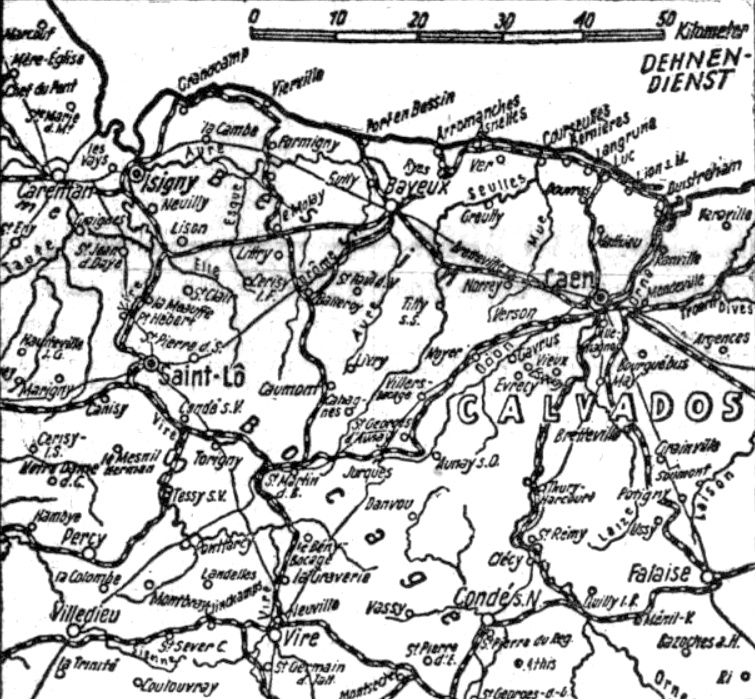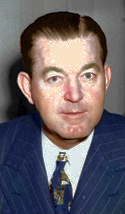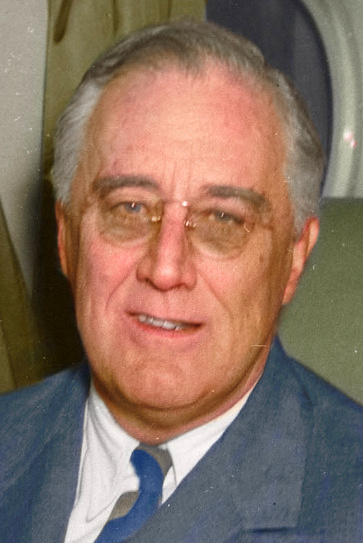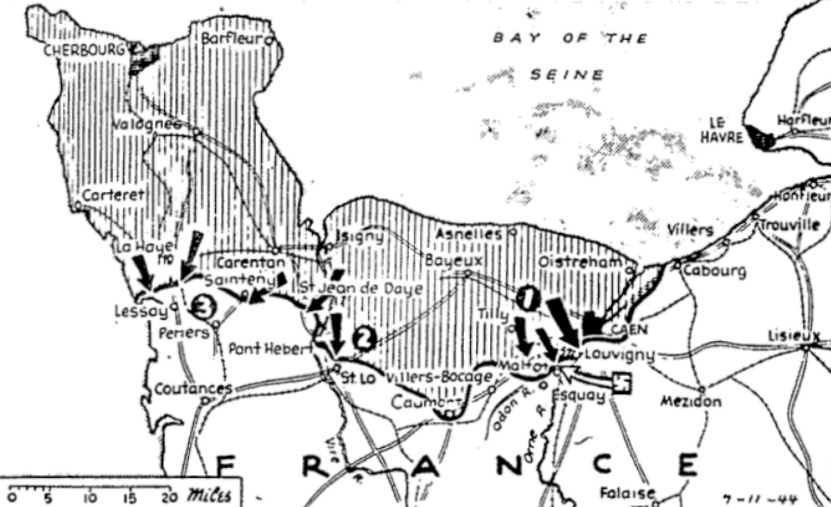Innsbrucker Nachrichter (July 11, 1944)
Abwehrschlacht in der Normandie
Beispielhafte Tapferkeit unserer Truppen – Bei Kowel starke Sowjetangriffe abgeschlagen

dnb. Aus dem Führerhauptquartier, 11. Juli –
Das Oberkommando der Wehrmacht gibt bekannt:
In der Normandie ist nunmehr auf großen Teilen der Front des feindlichen Brückenkopfes die Abwehrschlacht im Gange. Unter stärkstem Einsatz von Artillerie, Panzern und Luftstreitkräften versuchen die Anglo-Amerikaner immer von neuem, unsere Front aufzureißen, um dann in die Tiefe des französischen Raumes stoßen zu können. In beispielhafter Tapferkeit halten unsere Truppen dem feindlichen Ansturm stand. Die Verluste des Feindes sind sehr groß. Am 8. und 9. Juli wurden im Raum von Caen 102 feindliche Panzer abgeschossen.
Am gestrigen Tage trat der Feind östlich der Orne zum Angriff nach Osten an und wurde abgewiesen. Südwestlich Caen konnte der Gegner dicht hinter unserer vorderen Linie den Ort Maltot nehmen. Ein Gegenangriff unserer Panzergrenadiere warf daraufhin die feindlichen Angriffsgruppen wieder zurück. Westlich davon wurde um eine beherrschende Höhe erbittert gekämpft, die im Laufe des Tages mehrmals den Besitzer wechselte, bis sie am Abend endgültig in unserer Hand blieb. Bei Tessel-Bretteville wurden mehrfach wiederholte feindliche Panzerangriffe zerschlagen. Beiderseits der Straße Carentan–Périers griff der Feind in breiter Front an. Nach schweren Kämpfen wurde er dicht südwestlich unserer alten Stellungen abgefangen. Auch im Raum von La Haye-du-Puits wurde erbittert gekämpft. Unsere Truppen behaupteten dort überall ihre Stellungen.
Im französischen Raum wurden gestern über 50 Terroristen im Kampf niedergemacht.
Die „V1“ belegt den Raum von London weiterhin mit schwerem Vergeltungsfeuer.
In Italien setzte der Feind in den alten Schwerpunkten seine Durchbruchsversuche fort. Trotz Einsatzes starker Panzerkräfte blieb ihm jedoch jeder größere Erfolg versagt.
Im Raum von Kowel haben Truppen des Heeres und der Waffen-SS in viertägigen harten Abwehrkämpfen den Ansturm von zehn sowjetischen Schützendivisionen, einem Panzerkorps und zwei Panzerbrigaden abgeschlagen und dem Gegner dabei erhebliche Verluste an Menschen und Material beigebracht. Bei diesen Kämpfen wurden im Zusammenwirken aller Waffen vor der Front und im Hintergelände 295 feindliche Panzer vernichtet. Die rheinisch-moselländische 342. Infanteriedivision unter Führung von Generalmajor Nickel, die rheinisch-westfälische 26. Infanteriedivision unter Führung von Oberst Fromberger und eine Kampfgruppe der 5. SS-Panzerdivision „Wiking“ unter Führung von Obersturmbannführer Mühlenkamp haben sich durch beispielhafte Standfestigkeit ausgezeichnet.
Im Mittelabschnitt der Ostfront stehen unsere Truppen bei drückender Hitze in auch für uns verlustreichen Kämpfen mit starken feindlichen Kräften.
Die heldenmütige Besatzung von Wilna schlug gestern in verbissenem Kampf den von allen Seiten angreifenden Feind blutig zurück. An der Stadt vorbei dringt der Gegner weiter nach Westen und Südwesten vor. Westlich der Eisenbahn Wilna–Dünaburg wurden zahlreiche An griffe der Bolschewisten abgeschlagen.
Südlich Dünaburg sind heftige Kämpfe mit schweren bolschewistischen Schützendivisionen und Panzerverbänden im Gange. Nördlich Polozk wiederholte der Feind nach den hohen blutigen Verlusten der Vortage seine Durchbruchsversuche gestern nicht mehr. Dagegen gelang dem Gegner südöstlich Nowoschew ein örtlicher Einbruch. Kämpfe sind dort noch im Gange.
Schlachtfliegergeschwader unterstützten in zahlreichen Einsätzen unsere schwer ringenden Truppen, besonders im Raum von Wilna. Sie vernichteten zahlreiche Panzer und Geschütze sowie über 200 Fahrzeuge der Sowjets.
Einzelne britische Flugzeuge warfen in der vergangenen Nacht Bomben auf Berlin.



